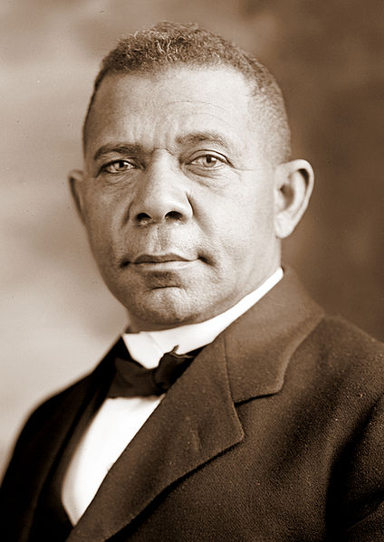|
|
|
Booker T. Washington (1856–1915). (Wikimedia Commons) |
Booker T. Washington was born a slave in Virginia in 1856. Early on in his life, he developed a thirst for reading and learning. After attending an elementary school for African-American children, Washington walked 500 miles to enroll in Hampton Institute, one of the few black high schools in the South.
Following his graduation from Hampton, for a few years Washington taught elementary school in his hometown. In 1880, General Armstrong invited him to return to teach at Hampton. A year later, Armstrong nominated Washington to head a new school in Tuskegee, Alabama, for the training of black teachers, farmers, and skilled workers.
Washington designed, developed, and guided the Tuskegee Institute. It became a powerhouse of African-American education and political influence in the United States. He used the Hampton Institute, with its emphasis on agricultural and industrial training, as his model.
Washington argued that African Americans must concentrate on educating themselves, learning useful trades, and investing in their own businesses. Hard work, economic progress, and merit, he believed, would prove to whites the value of blacks to the American economy.
Washington believed that his vision for black people would eventually lead to equal political and civil rights. In the meantime, he advised blacks to put aside immediate demands for voting and ending racial segregation.
In his famous address to the 1895 Cotton States and International Exposition in Atlanta, Georgia, Washington accepted the reality of racial segregation. He insisted, however, that African Americans be included in the economic progress of the South.
Washington declared to an all-white audience, “In all things social we can be as separate as the fingers, yet one as the hand in all things essential to mutual progress.” Washington went on to express his confidence that, “No race that has anything to contribute to the markets of the world is long in any degree ostracized.”
White Americans viewed Washington’s vision as the key to racial peace in the nation. With the aid of white philanthropists such as Andrew Carnegie, Washington’s Tuskegee Institute and its philosophy of economics first and equal rights later thrived.
Recognized by whites as the spokesman for his people, Washington soon became the most powerful black leader in the United States. He had a say in political appointments and which African-American colleges and charities would get funding from white philanthropists. He controlled a number of newspapers that attacked anyone who questioned his vision.
Washington considered himself a bridge between the races. But other black leaders criticized him for tolerating racial segregation at a time of increasing anti-black violence and discrimination.
Washington did publicly speak out against the evils of segregation, lynching, and discrimination in voting. He also secretly participated in lawsuits involving voter registration tests, exclusion of blacks from juries, and unequal railroad facilities.
By the time Booker T. Washington died in 1915, segregation laws and racial discrimination were firmly established throughout the South and in many other parts of the United States. This persistent racism blocked the advancement of African Americans.
For Further Reading
Smock, Raymond. Booker T. Washington in Perspective: Essays of Louis R. Harlan. Jackson, Miss.: University Press of Mississippi, 2006.


